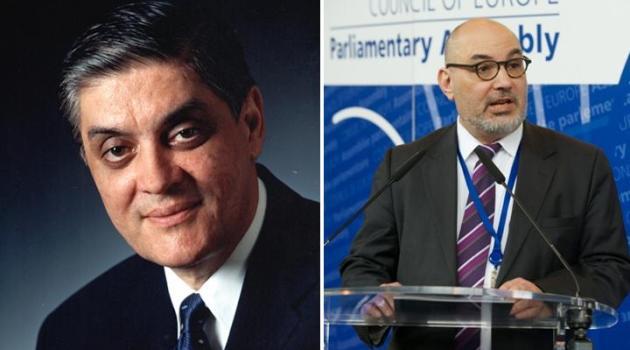Will there ever be more Romani politicians in Germany?

It is no easy task to write about the active participation of Roma and Sinti in German politics, not that the information on this topic is kept secret somehow. The problem, rather, is that there have not been many activities to date that could be considered essentially political.
This does not mean that German Sinti and Roma are not interested in what is going on around them, or that they have been unwilling to get involved. It does, however, tell us a great deal about the postwar developments in Germany, a legacy the country is still finding it hard to grapple with to this day.
For many German readers, and perhaps even for many Czech readers, this is starting to sound like a familiar tune – when Romani people in Germany are mentioned, Nazi crimes and their impact on the postwar era are almost automatically referenced. That chapter of German history simply cannot be avoided.
This is not just about the Romani Holocaust, as our current situation has also been strongly influenced by the antigypsy atmosphere in Germany during the 1950s, 1960s and 1970s, which made it practically impossible for German Roma and Sinti to become politically engaged in any way. That era is best described by the following examples: In the 1980s the Federal Criminal Office in Wiesbaden published handbooks against Sinti and Roma while the Criminal Police diligently published training materials repeating formulations about Roma and Sinti from Nazi literature.
It is therefore no surprise that the effort to correct these historical wrongs also became the most important motivation and main aim of Romani activists in Germany. In 1972, the first Romani organization, called the Central Commission of Sinti in West Germany, was founded by Vinzenz Rose, the uncle of the present-day spokesperson for German Roma, Romani Rose.
When he was not quite 30 years old, Romani Rose began his political work in Germany, and his activity soon began to excel that of his uncle. During Easter in 1980, he organized a week-long hunger strike by 12 Sinti at the former concentration camp at Dachau in order to contribute to the struggle for international recognition of the genocide of Romani people during the Second World War.
He succeeded, and on 17 March 1982, Romani Rose and a delegation of German Sinti and Roma were received by then-Chancellor Helmut Schmidt, who acknowledged that Romani people had been persecuted during Nazism, not for "security" reasons, as had previously been claimed, but for racial ones – i.e., what happened to them really was a case of genocide. From the perspective of history and international law, this was an important milestone and one of Romani Rose’s most significant successes.
Another of his meritorious enterprises was his establishment of the Central Council of German Sinti and Roma, which was created in February 1982 and which is directed by Rose to this day. This is still the country’s biggest umbrella organization of regional and state associations of German Sinti and Roma.
Since 1991, Romani Rose has been the executive head of the Documentation and Cultural Center of German Sinti and Roma in Heidelberg. Another of his significant successes was achieving official recognition of and support for German Sinti and Roma from the German state as an officially "German" minority.
Another Romani activist in Germany, Rudko Kawczynski, is Romani Rose’s counterpart. This defender of the rights of Romani people was born in Cracow, Poland and moved with his family to Germany when he was three years old.
Kawczynski’s main topics include not only the Nazi era and compensation for Romani victims, but also the fight against deporting Romani refugees back to countries in eastern and southeastern Europe and ending discrimination against Romani people in general throughout Europe. The start of his political career was rapid and tempestuous.
In June 1989, at the age of 34, Kawczynski was symbolically nominated as the top candidate for the West German Green Party in the elections to the European Parliament. His motto was "Gypsies, get into politics. Romani people, hurry up, become Chancellor."
However, because Kawczynski had never been awarded German citizenship (just a kind of identification issued to "foreign citizens"), he was forbidden from actually running for office. The Green Party nevertheless vowed to send him to Strasbourg as a political officer of the party.
The candidacy of this politician, who "couldn’t be elected and couldn’t even vote himself", earned a great deal of criticism from the center of the Green Party and from the Central Council of German Sinti and Roma. An anonymous, prominent member of the Greens, for example, let it be known that he did not approve of this "Gypsy show" and that "many party delegates did not have the courage to speak up or vote against Rudko’s candidacy because they feared being labeled ‘xenophobes’."
The Central Council of German Sinti and Roma charged Kawczynski with exploiting stateless Romani migrants and refugees "for his own spectacular performances." During the 1990s Kawczynski actually relocated his focus to European institutions and his work in Germany was destroyed.
Kawczynski was a co-founder of the Roma National Congress and in December 2005 was elected the first president of the newly-established European Roma and Travellers Forum, which he still chairs today. Germany is still waiting, therefore, for its first "truly German" politician from the ranks of the Roma and Sinti.
The first important sign that some change has been occurring in this area in recent years is the candidacy of Romeo Franz, a Sinto, for the parliament this year, which was not successful this time around. For an interview with him, please see: http://www.romea.cz/en/news/romeo-franz-europe-must-be-free-of-discrimination-and-racism.